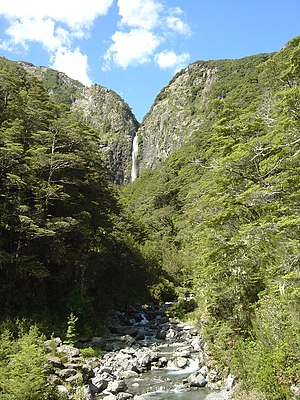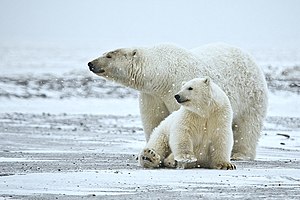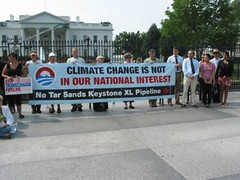 Image via Wikipedia
Image via WikipediaBy
Timothy Zaun
Tracey Bianchi is a married mother of three young children, living in Chicago. Her environmental concerns for both her family and future generations inspired her to write
Green Mama: The Guilt-Free Guide to Helping You and Your Children Save the Planet.
Bianchi earned a master of divinity degree and is a frequent speaker and writer on topics of Christianity. Regardless of your religious beliefs or denomination, and whether or not you have children,
Green Mama will enlighten you to the earth's dwindling natural resources; and how you can make a positive impact.
Here, the topics of greening your travel and worship, along with advocacy for planting a tree are discussed.
Greening Your Travel
Before traveling, ask yourself if you really need to get there at all. Monitoring your travel can reduce fuel consumption, carbon emissions and consumerism. U.S. residents are responsible for approximately 25 percent of the world's carbon emissions even though we have only 5 percent of the population.
Before jumping in the car, ask these potentially life-changing questions:
- Have I chosen a green place to live? Answers vary according to circumstances. For you, that might mean multiple acres in a rural area or easy access to public transportation.
- Do I live close enough to the amenities I need or the places I frequently visit? Next time you move, consider not only housing costs and school district quality. Think too about the commute time to routine travel, including the grocery store, church and library.
- Do I really need to do this today or can I do it another time as part of another errand?
- Can I walk or bike there instead?
- Who else can I bring with me (i.e. a neighbor who needs to go grocery shopping a the same time)?
- Can I combine the trip with another errand?
- Am I shopping locally? Are all of my errands as close to home as possible?
Air Travel
The World Wide Institute states that one plane crossing the Atlantic Ocean uses16, 000 gallons of fuel. That's enough to power one car for fifty years.
Before flying, ask yourself if you can travel by car or train. Take public transportation to and from the airport whenever it's possible. Bring your own snacks and decline drinks, napkins and plastic cups offered on the plane.
Realize that you might be skiing at a resort that doesn't monitor its carbon emissions. Long-term, the very commodity they're selling (snowfall) could diminish with climate change. Eating at certain seafood restaurants, while enjoyable, may be purchasing their food from overfished waters. "Be an educated traveler and make a difference when you can," says Bianchi.
Green Your Hotel and Resort Stays
Bring home half-used bottles of shampoo and lotions. Use them up and recycle the containers. Look for water-saving tips from your hotel. Now, many offer water conservation programs that ask you to reuse your towels and bed linens the next day.
Vacation with a Purpose.
"Purposeful vacations take into account the social imprint of your vacation as well as the ecological practices of the places you visit," says Bianchi.
Consider an Eco-Vacation, a Mission Project or a Conservation Trip.
Your local church or park district may offer trips and ecotourism vacations to destinations where you and your family can stay together. Cleaning up trails, helping to create a habitat for endangered wildlife and serving needy families worldwide are among the many vacation opportunities.
Buy a Hybrid Car; They Make a Difference.
The smaller and slower the car, the better the fuel efficiency.
Greening Your Worship
Your place of worship (or any other community setting you experience, including work) may ignore promoting an eco-friendly atmosphere. "Turns out the very buildings that were designed to proclaim the wonders of the God of the universe are some of the least green places in the country," says Bianchi.
Styrofoam cups, individualized creamer packets and sugars, stir sticks, multi-page bulletins, and company newsletters printed with petroleum-based ink (instead of eco-friendly soy-based inks) are among the eco-savvy detractors.
"Greening up the church is not a fad or some hippie luxury; it is good stewardship and it is our future," she says. Bianchi suggests two levels to start greening your worship:
1. Begin with your senior pastor, minister, rabbi, etc. A simple meeting with him or her can initiate the dialogue. Further talks can convene with committees, elders, trustees, and others leaders. Tap into your congregation's professional talents, including architects, engineers and HVAC experts.
Discuss who will lead the greening efforts. It may or may not be you. The green team will need to research recycling options, reasonable tweaks in lighting and energy and other common sense, eco-friendly adaptations.
2. Use personal, covert greening efforts if you meet congregational resistance. This includes turning off lights in classrooms, and collecting and recycling church bulletins and newsletters on your own.
A universal response from churches, nonprofits and other organizations that resist going green is cost. Today, many establishments are working with limited funds.
Greening a place can appear to be pricey. Waste haulers may charge additional fees to remove recyclables. Recycling bins can be costly and purchasing fair-trade coffee and teas may sell for more, but, once done, long-term savings often result.
In the church, some will question if a greener life is theologically supported. Going green will have its detractors in any setting.
Planting a Tree
None of us can save the world on our own, but we can each make a difference.
Bianchi mentions Wangari Maathai, a Kenyan activist who, in 2004, won the Nobel Peace Prize. Maathai says one thing we can do to fight environmental injustice, is plant a tree. It's something we can all manage. Plant something green whether you live in a high rise, farm or anywhere else. Plunge your hands into the dirt and bring forth life.
Greening your travel and worship offer a variety of ways to reduce your carbon footprint on earth. Consider planting a tree to promote perpetual life among nature.
Green Mama offers a gallimaufry of websites to help you live more consciously and reduce consumerism. One of the best is the Center For A New American Dream. Visit them here:
http://www.newdream.org/.
Timothy Zaun is a blogger, speaker and freelance writer. Visit him online at
http://timzaun.com.
Article Source:
http://EzineArticles.com/?expert=Timothy_Zaun
http://EzineArticles.com/?Green-Mama-by-Tracey-Bianchi---Greening-Your-Travel-and-Worship-and-Planting-a-Tree,-Eco-Book-Review&id=6618788
 Image via WikipediaHi readers,
Image via WikipediaHi readers,





